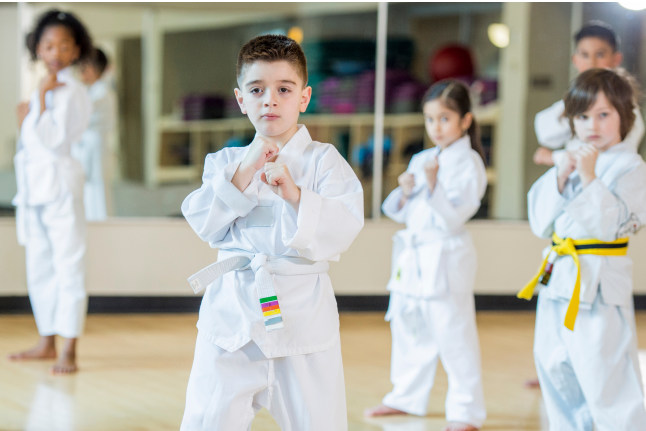By Dr Ali Saber Mohamed
At least 60 minutes/ day moderate to vigorous physical activity is associated with physical, Psychological , social, and cognitive health benefits (2). In terms of cognition, physical activity improves children’s executive functions which are the mental abilities involved in action planning and inhibition of undesired behaviors (3).
Physical activity can reduce internalizing and externalizing problems in adolescents (4). Physical activity interventions improve communication and social functioning in individuals with autism spectrum disorder (1).It also reduces stereotypic behaviors in both children and adults (5). Group-based physical activity interventions have moderate effect on social functioning in children with autism spectrum disorder (6).
Martial arts training is efficacious spots-based mental health intervention for improving wellbeing and reducing symptoms associated with internalizing mental health (7). In treatment programs for Autism Spectrum Disorders, martial arts routines proved effective in balance skills, coordination of movements, and communication (8).
Taekwondo is a kind of martial arts that involves punching, kicking, jump kicks, and use of hands and feet to attack or defend (9). Taekwondo training is a funny, feasible, and effective therapeutic option for balance improvement of children with Autism Spectrum Disorder (10). The effects of Taekwondo training on balance have also been investigated in children with developmental coordination disorder, who demonstrate similar motor delays and balance deficits as children with Autism Spectrum Disorder with successful results (11).
Participation in Taekwondo appears to speed up the development of postural control and vestibular function in adolescents (12). An increase in knee extensor muscle strength and standing on one leg during kicking can be considered a reason for improving posture control (13).
In conclusion, martial arts practice can effectively improve static and dynamic balance in individuals with Autism Spectrum Disorder. Moreover, children have demonstrated a higher willingness to participate in such programs.
References :
1- John Chan et al ( 2020 ). The effectiveness of physical activity interventions on communication and social functioning in autistic children and adolescents: a meta-analysis of controlled trials. Autism, 2020; 25(4)
2- Poitras V J et al ( 2016 ). Systematic review of the relationships between objectively measured physical activity and health indicators in school-aged children and youth. Applied Physiolog,Nutrition, and Metabolism, 2016; 41(6), s 197-239
3- Donnelly J E et al ( 2016 ). Physical activity , fitness , cognitive function, and academic achievement in children: a systematic review. Medicine and science in sports and exercise, 2016; 48(8): 1197-1222
4- Spruit A et al ( 2016 ).The effects of physical activity interventions on psychosocial outcomes in adolescents: a meta-analysis review. Clinical psychology review, 2016;45:56-71
5- Bremer E et al ( 2016). A systematic review of the behavioral outcomes following exercise interventions for children and youth with ASD. Autism, 2016;20(8):899-915
6- Howells K et al ( 2019 ). Efficacy of group-based organized physical activity participation for social outcomes in children with ASD: a systematic review and meta-analysis. J Autism Devel Disord, 2019; 49(8):3290-3308
7- Bran Moore et al (2020). The effect of martial arts training on mental health outcomes: a systematic review and meta-analysis. J Bodyw Move Therap, 2020 July; 24(4)
8- Li Li et al ( 2022 ). Comprehensive intervention and effect of martial arts routines on children with autism. J Environ Public Health, 2022
9- Fong SS, Ng GY ( 2011 ). Does Taekwondo training improve physical fitness? PHYSICAL Therapy Sport, 2011;12:100-106
10- Yumi Kim et al ( 2016 ). Effects of Taekwondo intervention on balance in children with ASD. J Exerc Rehabil, 2016 Aug; 12(4):314-319
11- Fong SS et al (2013). Differential effect of Taekwondo training on knee muscle strength and reactive and ststic balance controlin children with developmental coordination disorder: a randomized controlled trial. Res Dev Disabil, 2013 May
12- Fong SS et al (2012). Taekwondo training speeds up the development of balance and sensory functions in young adolescents. J Science Medicine in Sport. 2012 Jan; 15(1):64-68
13- Rabeeh Hariri et al (2022). An overview of the available intervention strategies for postural balance control in individuals with ASD . Autism Research and Treatment . 2022
أخصائى الأمراض النفسية والعصبية بمستشفى آل سليمان وشركة كهرباء مصر
طبيب جمعية ومركز التأهيل الشامل للمعاقين بمحافظة بورسعيد
مستشار إعاقات الطفولة لجمعية نور الرحمن
صاحب مدونة ( إطلالة على التوحد ),
كاتب ومؤلف بمجلة وكتاب المنال الصادر عن مدينة الشارقة للخدمات الإنسانية
كاتب بمجلة أكاديمية التربية الخاصة السعودية


























